In its seventh year, Transitions Film Festival is once again hosting a range of different Australian and international films – this time turning the lens to themes including climate change, animal welfare, the future of food and ocean health.
The festival’s director, Daniel Simons, strongly believes that anyone can make a difference and have an impact on these issues. The main aim of the festival is to educate people and inspire a positive shift in culture so that we can become well-informed builders of our collective future.
The festival is a place where people from all demographics and backgrounds can learn and share their ideas. “One of the great things about the festival is the diversity of themes and how this allows the cross-pollination of different communities in Melbourne,” Simons says. “There aren’t that many places where start-up entrepreneurs, climate activists, social justice advocates, computer enthusiasts and film lovers can come together around one idea.”
In the festival’s first year it screened ten films, and this year it has grown to screen over 30. This year there’s a strong emphasis on game changers, and the potential for radical change and disruption.
“From the possibility of runaway climate change to the existential threat of plastics in our oceans,” says Simons. “From the revolutionary power of artificial intelligence, to the potential of a world without work, the films in this year’s program allow us to reconnect with the ideas that will shape our lives for generations to come.”
Simons also wants the festival to inspire people to make positive changes in their lifestyles but he gets even more excited when audience members are so inspired by the films that their change is much greater. In last year’s festival exit surveys, a lot of people said that, as a result of watching one of the films, they’d change their career goals and their courses of study.
“That’s what we are really inspired by,” he says. “Not just small changes that reduce our negative impact on the planet, but the opportunity to motivate the amazing, passionate, intelligent humans of Australia to direct their skills and energy into the areas that will have the most profound implications for the future of humanity.”
Kicking off the festival in Melbourne is Food Fighter, a feature film by Australian filmmaker Dan Goldberg about the founder and CEO of OzHarvest, Ronni Kahn, and her epic battle to end food waste in Australia. Following the film will be a Q&A session with Kahn and Goldberg. Simons says that Transitions Film Festival is lucky to be touring with Kahn and Goldberg and are really excited to have other filmmakers on board.
Other festival highlights include films such as Amplify Her which celebrates women’s empowerment, exploring the power of femininity and the role of women in the electronic music industry, and The Gateway Bug focuses on cricket-as-protein start-ups and investigates the potential of insects to radically improve our global food system.
Ideas of ocean wellbeing are explored in Operation Jeedara, an Australian documentary narrated by Bob Brown, which follows the mission of a brave crew as they set out to protect the Great Australian Bight from the destructive impacts of oil pollution. Furthermore, Free Lunch Society, discusses the history and future of Universal Basic Income as a solution to the automation economy and the end of jobs, while the final film of the festival – Albatross – focuses on the consequences of plastics on our oceans and wildlife, by Seattle-based activist Chris Jordan.
After closing in Melbourne, the festival then goes on to tour with selected films in Sydney, Perth and Brisbane before wrapping up in Adelaide at the end of May. Simons encourages people to attend, the threats we are currently facing can’t be ignored any longer.
“If we don’t create our future it will be created for us,” he says. “We have such a beautiful opportunity right now to create a utopian future of peace and abundance, but if we aren’t engaged and active, we could very easily slip into a dystopian nightmare, and it could happen quicker than we think. In some parts of the world, it’s already happening.”

